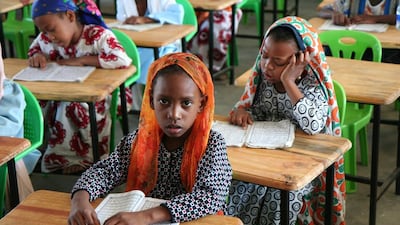DUBAI // Tens of thousands of girls in the Philippines, Mozambique and South Sudan are to benefit from educational programmes launched by Dubai Cares with a combined budget of Dh22 million.
The programmes aim to empower girls by encouraging them to finish primary and secondary school educations.
They are likely to address the need for better water sanitation and may offer very poor families financial incentives to send their girls to school.
In some cases young mothers will be offered the option of distance learning.
Plan International Canada is partnering with Dubai Cares in the initiative, the launch of which coincides with the UN’s International Day of the Girl Child on October 11.
“Around the world, millions of girls face barriers to education that boys usually do not, something many of us at Dubai Cares have witnessed during our field visits,” said Tariq Al Gurg, the chief executive of Dubai Cares.
“Our support for the Philippines, Mozambique and South Sudan underscores our belief that girls’ education is significant in the fight against poverty.
“It creates a ripple effect of positive change in the community and country. As future mothers and wives, who will play an integral role in nurturing and raising families, these girls hold the key to a future generation of educated and enlightened children.”
Programmes will be tailored to each country but all will reach out to girls who have either discontinued their learning or never had access to education due to social constraints.
“The programmes are in the design stages so we will soon have more details about the specifics such as the number of beneficiaries,” said Mr Al Gurg. “But they will be tens of thousands.”
Dubai Cares, a philanthropic organisation which works to improve children’s access to education in developing countries, said these three countries were chosen because of their great need.
The programmes will take place over four-year periods. In addition to tackling the physical barriers to education, the programmes aim to improve the quality, relevance and gender sensitivity of teaching materials and transform school environments to safer, more supportive and girl-friendly ones.
The programmes are also part of the UN’s five-year Global Education First Initiative, launched in September last year. Dubai Cares is a technical adviser to the initiative.
Plan International Canada will execute the programmes and also contribute an extra 10-15 per cent on top of the Dubai Cares budget of Dh22m.
Dr Tanjina Mirza, vice president of international programmes at Plan Canada International, said that each country faced a unique set of circumstances.
“We hope these programmes will serve as a model for the respective governments as well as internationally. We want to show that they work,” said Mrs Mirza.
She outlined issues such as a lack of female teachers, inadequate water sanitation and a lack of bathrooms especially in Africa as reasons many girls did not complete their primary education.
In South Sudan only 16 per cent of women have completed primary education.
wissa@thenational.ae

